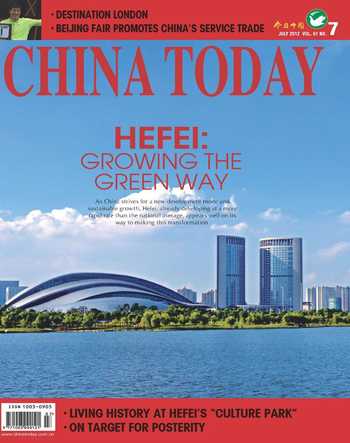utopian sojourn
By XIE GANG
qing in Guangdong Province, and Bamei Village of Guangnan County in Yunnan Province. One factor uniting these claims is that a grove of blooming peach trees is commonly perceived as a bucolic ideal, particularly from a contemporary perspective.
Heaven at the end of a Limestone Tunnel
I found a place that approaches the idyll depicted in Tao Yuanmings prose last year when I visited Bamei Village of Guangnan County in Yunnan Province. Its pristine quality is thanks mainly to the villages remote location. Karst landforms in southeastern Yunnan appear as jungles of bamboo shoot-shaped outgrowths that function as a barrier between it and the world beyond. Bamei, located on a plain amid these karst ranges, consists of fewer than a hundred households. The crystal-clear Tuoniang River that connects the village through a limestone tunnel leading to Fali Village to the north and Tangna Village to the south is the only local transportation route and way out. Encircled with mountains, no roads lead out of Bamei, and rowing boats are the main conveyance to and from the village.
Fali Village is one of the two means of access through the limestone tunnel in the leisurely flowing Tuoniang River to Bamei. On arriving in Fali I noted
when locals are busy either harvesting or collecting firewood on the mountain. As with many ethnic minorities, Zhuang women are central to the organization and maintenance of the whole family.
The Tuoniang River is a source of life to local inhabitants, providing them with clean drinking water, a source of irrigation via the picturesque but functional waterwheel, and a place to bathe. Old Huang told us the legend that gave the river its name. Tuoniang means“carry mother on the shoulders.” Long ago during a period of constant war, a mother and her 16-year-old son agreed to attempt an escape from chaos. The son hit upon the idea of carrying his mother in one bamboo basket and their belongings in another to the site of what is now Bamei Village. When a torrential river got in the way, the boys mother implored him to let her jump into the river and make good his own escape. He of course refused, and continued to battle his way across the raging waters carrying his mother on his shoulders. Just then, a beautiful Zhuang girl appeared in a flat-bottom boat singing the sweet refrain, “Green river, green mountains, a filial son carries his mother across the river.” She helped the pair cross the torrent and took them to a place inhabited by immortals. The river instantly calmed and cleared, and was thereafter named Tuoniang.
The Tuoniang River has abundant fish. Since the river is in karst area, the fish are not large, but nonetheless succulent and tasty. Villagers catch dozens per day in bamboo traps that they set each evening. First marinating and then grilling fish on a bamboo spit over a charcoal fire is the preferred local cooking method. Another when entertaining guests is boiling fresh-caught fish with pickled Chinese cabbage, which produces a delectable soup.
Cattle wander freely in Bamei Village. They perform a vital function as draft animals as the narrow, shallow, rockladen Tuoniang River cannot accommodate power-generating equipment. Placid but strong oxen and water buffalo plow fields and also draw the wooden carts that are the local form of public transportation.
Bamei people are diligent but know how to enjoy life.It is commonplace after a days work to invite neighbors or visitors to sit at the table and share with them a tasty dish of fish or smoked pork, fried specialties or soybeans washed down with a cup of homebrewed rice wine. After dinner, they might then enjoy puffing on a water pipe or sipping a post-prandial cup of tea while listening to birdsong in the overhead branches of the banyan tree.

